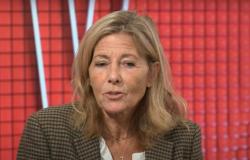>> Credit Suisse to borrow 50 billion Swiss francs from central bank
>> Credit Suisse to be taken over by UBS, Swiss government says
>> Swiss Central Bank, first major Western central bank to lower its rates
| The SNB also lowered its inflation forecast to 1.2% for 2024 from 1.3% at its quarterly meeting in June. |
| Photo: AFP/VNA/CVN |
The SNB cut its key interest rate by a quarter of a percentage point to 1%, it said in a statement.
It also lowered its inflation forecast to 1.2% for 2024 from 1.3% at its quarterly meeting in June, 0.6% for 2025 (from 1.1% previously) and 0.7% in 2026 (from 1% previously).
This downward revision “is explained in particular by the appreciation of the franc, the fall in the price of oil and the drop in electricity prices announced for January”she said in the press release.
However, it left its growth forecast unchanged at 1% for 2024.
Many economists had expected a cut of at least a quarter of a percentage point given the sharp decline in inflation, which has been below 2% for more than a year and fell to 1.1% year-on-year in August.
But since the decision of the American Federal Reserve (Fed) last week, some have not ruled out the possibility that the SNB will make a more marked reduction by also cutting its rate by half a percentage point.
Others were thinking of a more gradual approach, with one of 0.25% in September, followed by two other cuts of the same magnitude in December and March.
At around 0750 GMT, the Swiss franc was up slightly by 0.22% at 0.8485 Swiss francs per dollar and was up 0.07% against the euro at 0.9461 Swiss francs per euro.
Pressure
Last week, the Swiss Watch Industry Employers’ Convention and the Watchmaking Federation called on the central bank to take action to combat the high value of the Swiss franc, which is putting pressure on a sector already facing a difficult situation with falling demand in China.
In August, Swissmem, the industry’s employers’ organisation, had also urged the SNB to intervene, as the strong appreciation of the franc against the euro since mid-July risked dampening hopes of recovery in this sector, which is heavily dependent on its exports, it had warned.
Like gold, the yen or German bonds, the Swiss franc is one of the major safe havens behind which investors take refuge in times of uncertainty.
Between the European and legislative elections in France, geopolitical tensions and tremors on the stock markets, the Swiss franc has recovered against the euro since the end of May, then accelerated significantly during the summer, approaching its peaks of late 2023 and early 2024. Since mid-July, the euro has lost around 3.10% against the Swiss franc.
With inflation falling, the Swiss central bank was able to kick off the rate cuts of the major Western central banks. An initial cut of a quarter of a percentage point in its key rate in March was followed by a second of the same magnitude in June.
AFP/VNA/CVN





